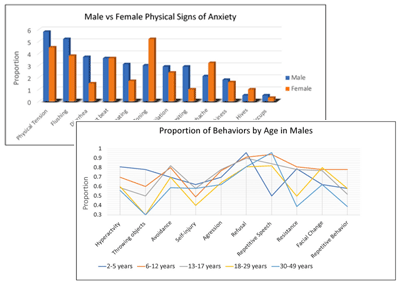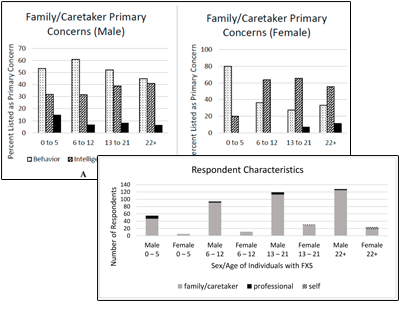Fragile X: Original Research Articles | NFXF (original) (raw)
-
- Fragile X 101
* Fragile X 101
* Prevalence
* Signs and Symptoms
* Genetics and Inheritance
* Testing and Diagnosis - Fragile X Syndrome
* Fragile X Syndrome
* Newly Diagnosed
* Fragile X & Autism - Associated Conditions
* Premutation
* FXPOI
* FXTAS
* New Developments - Xtraordinary Individuals
- 31 Shareable Fragile X Facts
- Fragile X Info SeriesFact sheets by topic
- Fragile X MasterClass™️
- Knowledge CenterFrequently asked questions.
- Fragile X 101
-
- Resources for Families
- FXS Strategies by Topic
* Adulthood
* Autism
* Behavior
* COVID-19
* Daily Living
* Females
* Medications
* Physical & Medical Concerns
* Puberty & Sexuality
* School & Education - FXS Resources by Age
- Premutation Topics
* The Fragile X Premutation
* FXTAS Resources
* FXPOI Resources
* Reproductive Resources - Newly Diagnosed
- ResearchLearn and participate
* Research 101What is research?
* STX209 Reconsent ProjectEnrollment is open
* International Fragile X Premutation Registry — For ParticipantsEnroll now
* Participate in ResearchMyFXResearch Portal
* Original Research Articles
* FORWARD-MARCHDatabase and registry
* Research ResultsNew and archives - Find a Fragile X Clinic
* U.S. Fragile X Syndrome Clinics
* FXTAS-Specific Clinics
* International Clinics & Organizations - Find a Contact Near You
- Knowledge CenterOur Fragile X library
- Webinars & Videos
- Printable Resources
- Treatment Recommendations
-
- Resources for Professionals
- NFXF MasterClass™️ for Professionals
- Research Readiness ProgramResearch facilitation for researchers
- NFXF Data Repository
- International Fragile X Premutation Registry — Research Requests
- FORWARD-MARCHRegistry & Database
- NFXF-Led PFDD Meeting for Fragile X SyndromePatient-focused drug development
- Marketing Your Research Opportunities
- Treatment Recommendations
- Fragile X Clinics
* U.S. FXS Clinics
* FXTAS-Specific Clinics
* International Clinics & Organizations - NFXF RESEARCH AWARDS
* Randi J. Hagerman Summer Scholar Research Awards
* Junior Investigator Awards
Get
Involved-
- Fragile X 101
* Fragile X 101
* Prevalence
* Signs & Symptoms
* Genetics and Inheritance
* Testing and Diagnosis - Fragile X Syndrome
* Fragile X Syndrome
* Fragile X & Autism - Associated Conditions
* Premutation
* FXPOI
* FXTAS
* New Developments - Xtraordinary Individuals
- 31 Shareable Fragile X Facts
- Fragile X Info Series
- FRAGILE X MASTERCLASS
- Knowledge Center
- Fragile X 101
-
- Resources for Families
- FXS Strategies by Topic
* Adulthood
* Autism
* Behavior
* Daily Living
* Females
* Medications
* Physical & Medical Concerns
* Fragile X and Puberty & Sexuality
* School & Education - FXS Resources by Age
- Premutation Topics
* The Fragile X Premutation
* FXTAS Resources
* FXPOI Resources
* Reproductive Resources - Newly Diagnosed
- Research
* Research 101: What is Research?
* STX209 Reconsent Project
* International Fragile X Premutation Registry — For Participants
* Participate in Research
* Original Research Articles
* FORWARD-MARCH
* Research Results Roundup - Find a Clinic Near You
- Find a Contact Near Your
- Knowledge Center
- Webinars & Videos
- Printable Resources
- Treatment Recommendations
-
- Resources for Professionals
- NFXF MasterClass™️ for Professionals
- Research Readiness Program
- NFXF Data Repository
- International Fragile X Premutation Registry — Research Requests
- FORWARD-MARCH Registry & Database
- NFXF-Led Patient-Focused Drug Development Meeting
- Marketing Your Research Opportunities
- Treatment Recommendations
- Find a Clinic Near You
- NFXF Research Awards
* Randi J. Hagerman Summer Scholars
* Junior Investigator Awards
Fragile X: Original Research Articles
Fragile X: Original Research ArticlesDany Petraska2023-07-12T09:38:28-04:00
Fragile X: Original Research Articles
The original research articles here were written by Fragile X professionals within the FXCRC and NFXF team to address critical needs in Fragile X research and treatment.
These are open-access articles distributed under the Creative Commons Attribution License↗, which permits unrestricted use, distribution, and reproduction in any medium, provided the original work is properly cited. This encourages collaboration, and they are commonly referenced by industry and other professionals working on Fragile X.
The NFXF is dedicated to our vision of a world where every family is empowered to successfully navigate the Fragile X journey. To address the needs of the Fragile X community, we are proud to collaborate with Fragile X professionals who share our vision.
Thank you to the professionals who dedicate their careers to learning more about Fragile X. And thank you to the families who participated in the research summarized in these articles. We couldn’t do it without you!
Researchers interested in accessing this data, please visit the NFXF Data Repository.
Observable Symptoms of Anxiety in Individuals with Fragile X Syndrome
Parent and Caregiver Perspectives
This original research provides evidence that caregivers can reliably identify behaviors that are meaningful for anxiety, and may be represented on outcome measures that can be developed, validated, and later employed in clinical and research settings.

Voice of People with Fragile X Syndrome and Their Families
Reports from a Survey on Treatment Priorities
This paper presents family member, caretaker, professional, and self-reported information on the characteristics of Fragile X syndrome that have the greatest impact on daily lives. The responses highlight the role of anxiety and other key symptoms affecting their lives and demonstrate some of the challenges often encountered in “voice of the person” research within the population.

Best Practices in Fragile X Syndrome Treatment Development
Despite significant pre-clinical data supporting translation of many drugs to humans, combined with some success in early-phase studies, no definitive large-scale placebo-controlled trials have led to drug use indications specific to Fragile X syndrome.
We recognize the importance of issuing recommendations for methodology, including study design and strategies, which can maximize the potential for success for the bench-to-bedside treatment development pathway. With this in mind, we review key aspects of the process of Fragile X syndrome treatment development with an eye toward ensuring successful trials of new treatments, incorporating innovative research and stakeholder concerns, can be enacted.
Treatment Recommendations
While there is currently no cure for Fragile X syndrome, there are many areas of treatment and intervention that can improve the lives of affected individuals and their families. Given the proper education, therapy, and support, all persons with FXS can make progress.
Our treatment recommendations for the three primary Fragile X-associated disorders are written by and for professionals, with the understanding that they will be published online by the NFXF, read by caregivers, parents, and other family members (and in the case of some documents, by patients), and shared by those caregivers, parents, families, and patients with their own care professionals.